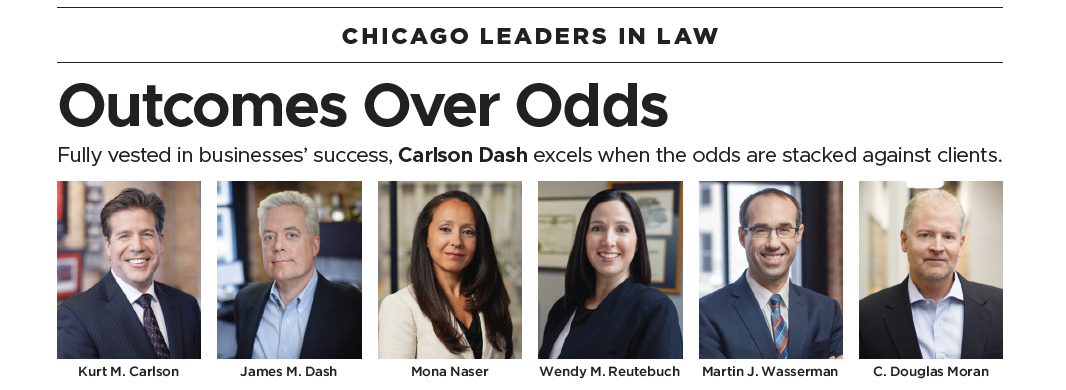
View original publication in Forbes & Fortune magazines – June 2022
When lenders were left holding the bag after a business with few assets failed, a creative solution was crafted. The attorneys at Carlson Dash asked what no one had asked before: Could ineffective directors and officers be held accountable for the losses? In a groundbreaking case involving D&O liability insurance, the bankruptcy court approved a seven-figure recovery for the commercial bank.
Over the past decade, imaginative, intelligent problem-solving has become the Chicago-based law firm’s trademark. “Results-driven service grounded in practical, outside-the-box legal advice is our top priority,” says Kurt M. Carlson, managing member of Carlson Dash.
Breaking away from traditional business law practices that measure success by revenue, Carlson, member
James M. Dash, and others formed Carlson Dash in 2011 with a fresh mission. “By focusing on creative problem-solving rather than billables, we know our firm will prosper,” says Dash. “When we can create a solution that helps all parties win, that’s when I know we’re doing the right thing.”
Person-First Problem-Solving
Shortly after its founding, Carlson Dash grew rapidly, attracting an impressive team of lawyers with a strong mix of business acumen and legal talent. Almost immediately, Carlson Dash
added a second office in Pleasant Prairie and later acquired a like-minded practice in Milwaukee.
Carlson Dash also expanded its legal services to companies of all sizes. In addition to business law, corporate bankruptcy, construction law, mechanic’s liens, commercial real estate, and commercial litigation, the firm’s staff includes lawyers with expertise in matters related to residential real estate, estate planning, special needs trusts, and employment law.
Carlson is particularly proud of his firm’s role in helping startups, including nonprofits like Matthias Academy—during a pandemic—a day program serving adults with mild to severe disabilities from Illinois and Wisconsin.
When a bank client was owed millions by a notable company that had filed a Chapter 11 bankruptcy, Carlson went toe-to-toe with an army of well-known lawyers and secured $20 million for his client on the first day.
“Despite our growth, we still function like a boutique firm. Whenever needed, we can assemble a few members of our own team to collaborate, bringing a tremendous breadth of knowledge to each problem. And, when something needs to be handled very quickly, we generally have all the resources needed in-house. For example, we recently took over a commercial real estate transaction that had completely stalled. We were able to finalize the sale of the valuable property within 45 days,” says Dash, whose published opinions
helped shape Illinois law regarding construction and mechanic’s liens.
Carlson attributes much of the firm’s success—whether in the courtroom or at the negotiation table—to the commitment the attorneys make personally with clients. “It’s not unusual to hear clients say we are like part of their staff or like having a general counsel on call,” he concludes. “This level of trust helps us understand their long-term goals, challenges, and opportunities.”

